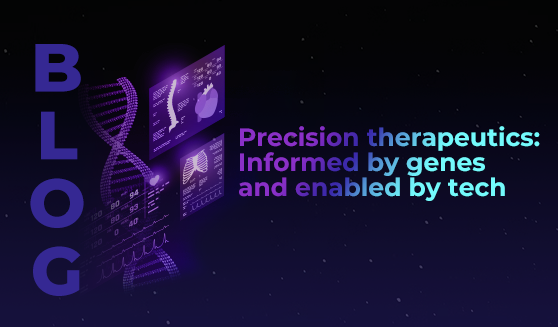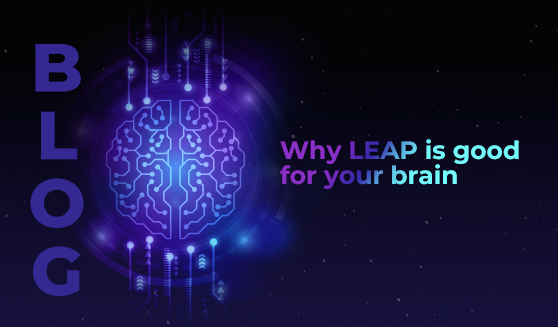
Technological development is driving major leaps forward in human genomics and healthcare. Scaleable sequencing technologies and AI-powered automated data analysis are expediting discoveries in the field of life sciences; and driving a new wave of healthtech companies that have real potential to solve the most serious health challenges faced by our species.
Mary Helen Black (VP, Head of Human Genomics at Foresite Labs) is one of the minds at the forefront of human genomics. Working on the development of precision therapeutics, she’s dedicated to bringing data and healthcare together to create more effective, tailored treatments for diseases including diabetes, heart disease, and cancer.
We asked Black why she’s so passionate about human genomics – and how emerging technologies are expediting developments in this field.
Could you briefly share your career journey so far, and what sparked your passion for human genomics?
“I have always been fascinated by the role of genomics in our health, and the degree to which our health is influenced by genes and lifestyle. Trying to understand how much of our traits are the direct result of our genes vs. environmental exposure or behaviours is key to finding better treatments for many of the common, complex disorders we struggle with today.
“For example, addiction and obesity are each increasingly recognised as having major genetic drivers, or at least as the result of gene-environment interactions, not just the result of environment or lifestyle choices.
“I've watched many of my own family members struggle with obesity, diabetes, heart disease, and cancer – susceptibility to these conditions is largely genetic, and we now know that we can use genetic information to not only find better treatments for these diseases, but also to discern which drug is the right one to take at the right time given a person's genetic background.
“After finishing graduate school, I worked across a variety of healthcare-related industries, first as a research scientist and principal investigator in a large, integrated health care system analysing data from electronic health records to better understand various diseases and address important care-related questions. Much of my work was focused on diabetes, cardiovascular disease, and osteoporosis; for example, trying to better understand genetic and environmental factors that contribute to diabetes progression in at-risk women with gestational diabetes, or assessing genetic contribution to safety issues of certain medications used to treat elderly patients with osteoporosis.
“I later worked for a clinical genetics diagnostic testing company, leading efforts to improve pathogenic variant prediction and develop polygenic risk scores for clinical use in breast and prostate cancer. In the past few years, I have leveraged this experience to work in the pharmaceutical industry, striving to help develop safer, more effective medicines.
“At Johnson & Johnson, I led a team of scientists to analyse massive-scale genomic and proteomic data for drug discovery and development. At Foresite Labs, a biotech incubator, I leverage the breadth of this background to lead a team of scientists in the analysis of large-scale genomics data, generating insights for new companies that can improve therapeutics, diagnostics, and health care delivery.
“Throughout my career in pharma, biotech, and healthcare research, I've worked to understand the genetic architecture of disease and how genomics can be used for disease diagnosis, prognosis, and treatment.”
How have emerging technologies in recent years changed the potential for leveraging genomics in drug development?
“We've reached an unprecedented time in human genomics with more data available today than ever before – whole exome and whole genome sequencing data linked to clinical information, and in some cases, extensive imaging, biomarker, and environmental/behavioural information on millions of individuals world-wide is now available for health research.
“Biotech and pharma leverage these data for many purposes – to better understand disease development; to develop safe and effective medicines; and to identify the specific patients that are most likely to benefit from new therapeutics.
“For example, whole genome sequencing on 500,000 individuals in the UK was recently performed and data made publicly available by the UK Biobank WGS consortium. This is high quality whole genome sequencing on an unprecedented scale.
“The cost of fast, high quality sequencing has dramatically decreased in the past few years, enabling drug target discovery in large populations. In addition, other '-omics' technologies – such as transcriptomics, proteomics, and metabolomics – are also decreasing in cost, and can be integrated with genomic data to identify biomarkers of disease progression and treatment response, as well as molecular profiles that point to which patients are more likely to benefit from new therapies.”
Do you expect technological advancements to change the landscape even more drastically in the years to come?
“With the advent of fast, high-throughput multi-omics data generation and decreasing costs to obtain it, ML/AI methods and compute infrastructure for analysis of these data at scale are increasingly important. Methods for analysis often lag a bit behind technology development, but given the current trends in development of ML/AI methodology for large-scale -omics, using these methods on such data will require compute power and deployment.
“While still a somewhat nascent field, quantum computing for genomics will become essential in the next few years as millions of whole genomes worth of data become available world-wide.
“For example, quantum computing can be used to process and analyse vast amounts of genomic data much faster, accelerating tasks such as sequence alignment and variant calling that are necessary before scientists can use the data to elucidate genetic mechanisms underlying disease and response to treatments. Quantum computing can also facilitate analysis of large multi-omics datasets, speeding up unsupervised learning that can for example, reveal complex gene regulatory networks that can also be used to understand disease and treatment response.”
Finally, could you describe your best experience at LEAP 2024?
“The breadth of the content presented and discussed at LEAP is truly incredible. Technology in every aspect of industry, whether finance, business, aerospace, robotics, health, education, and more, was well represented at this conference.
“Experts from all over the world were onsite to explain their work and dive deeply into conversations about how AI is accelerating development and/or enhancing the uses of technology. I truly enjoyed having in-depth conversations with scientists about AI-based technological advances and the impact they are having on a global scale, in so many aspects of our lives.”
Thanks to Mary Helen Black at Foresite Labs. If you want to stay at the forefront of technology across industries, join us in Riyadh for LEAP 2025.








